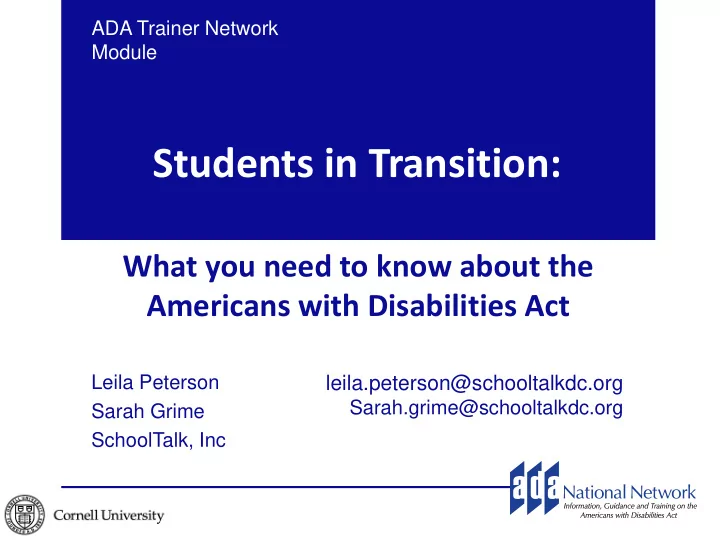

ADA Trainer Network Module Students in Transition: What you need to know about the Americans with Disabilities Act Leila Peterson leila.peterson@schooltalkdc.org Sarah.grime@schooltalkdc.org Sarah Grime SchoolTalk, Inc
Disclaimer Information, materials, and/or technical assistance are intended solely as informal guidance, and are neither a determination of your legal rights or responsibilities under the ADA, nor binding on any agency with enforcement responsibility under the ADA. The Northeast ADA Center is authorized by the National Institute on Disability and Rehabilitation Research (NIDRR) to provide information, materials, and technical assistance to individuals and entities that are covered by the ADA. The contents of this document were developed under a grant from the Department of Education, NIDRR grant number H133 A110020. However, those contents do not necessarily represent the policy of the Department of Education, and you should not assume endorsement by the Federal Government. 2
Civil Rights and Disability • The ADA is a civil rights law for people with disabilities • The law came about because people with disabilities fought for equal treatment • Asks society to think differently about disability 3
What is the ADA? “The ADA is the civil rights act of the future.” Justin Dart, Jr., A founder of the ADA “…The world’s first comprehensive declaration of equality for people with disabilities.” President George Bush, upon signing the ADA into law on July 26, 1990 4
Five Titles of the ADA Title I. Employment Prohibits disability discrimination in all employment processes Title 2. Accessibility in public entities Physical and program accessibility in state/local govt. entities Title 3. Accessibility in businesses Physical and program accessibility in restaurants, hotels, stores, places of business Title 4. Telecommunications Telephone and communications systems for the public Title 5. Miscellaneous Protection from retaliation 5
Do you have a disability under the law? What is a disability? …A physical or mental impairment that substantially limits one or more major life activities. 6
What’s the Difference between HS and after HS? • Change from entitlement to eligibility • Increased responsibility for individual with a disability • Learn as much as you can about: – Your strengths and weaknesses – What accommodations have worked for you in the past – How to talk about your disability in a positive way 7
Disclosing your Disability • Disclosure is a legally protected choice • Think it through…what are the pros and cons? • If you need a change at work or school to meet the requirements, you have to disclose your disability. • Don’t wait till its too late! 8
Talking about Disability • Talk about the positives • Let people know what you need to succeed. • Facing questions… 9
Accommodations • Your responsibility to ask if you need something different to succeed • Why do you need something different? • What worked for you in school? • Where do you go for support? 10
Think it through… • What environment will you be your best in? • What kind of teacher or manager do you need? • What support do you need to be successful? 11
Northeast ADA Center Employment and Disability Institute Cornell University Dolgen Hall Room 201 Ithaca, New York 14853-3901 Toll-Free : 800.949.4232 (NY, NJ, PR, USVI) Telephone 607.255.6686 Fax 607.255.2763 TTY 607.255.6686 Email northeastada@cornell.edu Web www.northeastada.org The contents of this presentation were developed under a grant from the Department of Education, NIDRR grant number H133 A110020. However, those contents do not necessarily represent the policy of the Department of Education, and you should not assume endorsement by the Federal Government. 12
Recommend
More recommend